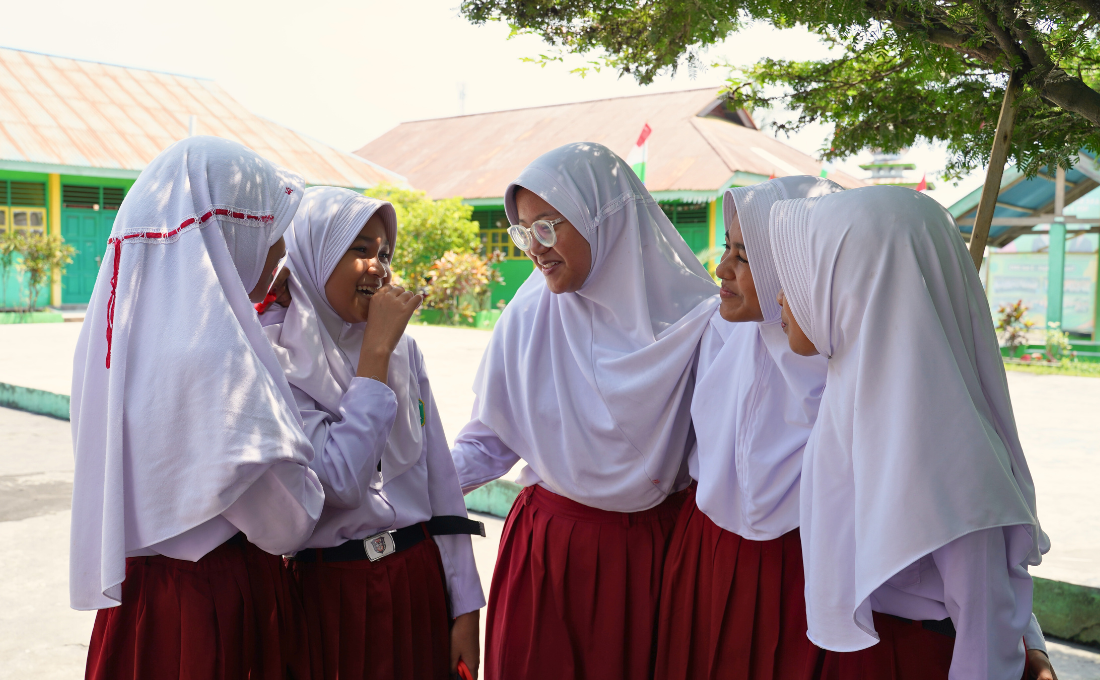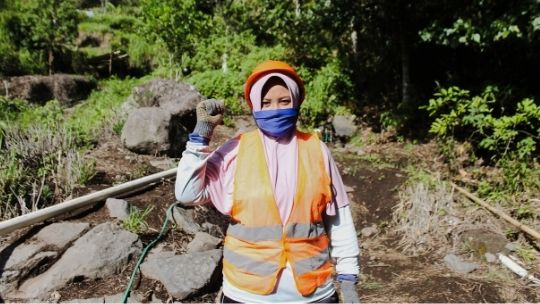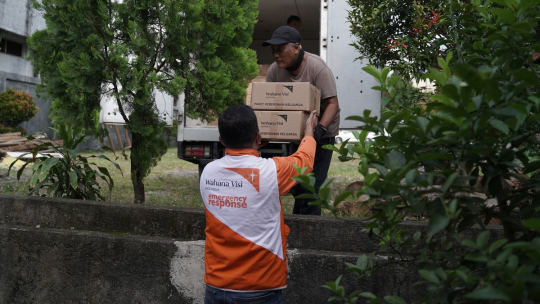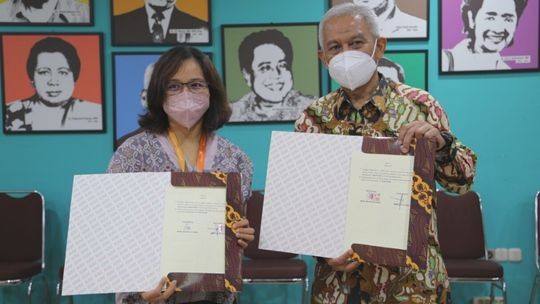The Collaboration for Quality Education in North Halmahera

School is one of the closest and most important aspects of a child's living environment. The majority of a child's cognitive, social, and emotional development is developed at school through the guidance of educators. Teachers, headmasters, committees, and heads of other school units are key determinants of Indonesia's future human resource quality. School should ideally be a pleasant and safe place for children to develop their potential to the fullest.
"If you want to find quality students, the teachers must also be quality," asserted the Regent of North Halmahera Regency, Pit Hein Babua, when receiving a visit from the KREASI programme team at his office. He continued, "In the next five years, education will be one of our focuses, which is also in line with the RPJMN (National Medium-Term Development Plan). To develop children's intellectual abilities and character, we need collaboration with various humanitarian organisations like this, so that this region is not only built by the government alone but together."
During the visit, the Regent of North Halmahera Regency also explained that the local government's work programme for the education sector will focus on three things: developing school facilities and infrastructure, improving the quality of educators, and developing schools that prioritise child protection. This local government work programme aligns with the main objectives of the KREASI programme, or Kolaborasi untuk Edukasi Anak Indonesia, which aims to accelerate the improvement of literacy, numeracy, and character education for pre-school and primary school students in eight regencies in Indonesia, including North Halmahera. The Regent hopes that this good collaboration can be the beginning of improving the quality of educators in primary and Islamic primary schools (SD/MI) and early childhood education (PAUD) in North Halmahera.
Educators in North Halmahera are Life-Long Learners
Wahana Visi Indonesia (WVI), the implementing partner of the KREASI programme in North Halmahera, has begun this good effort by conducting a series of training sessions for 48 educators who are being prepared to become Master Teachers. These educators will later become trainers for other teachers in their respective schools. During the training series, participants received material on how to create literacy and numeracy-rich teaching and learning activities. In addition, there was also material on leadership and management for educators acting as headmasters.
"I am an English teacher at this school. After attending the training, I understood how to integrate numeracy with English lessons. After the training, we also made plans to disseminate literacy and numeracy materials to other teachers," said Rahman, one of the MI teachers in North Halmahera.
Literacy and numeracy are crucial to integrate into teaching and learning activities because the teachers themselves still witness students in class five or six of primary school who have not yet mastered reading, let alone reading with comprehension. Based on this fact, teachers feel the need to know how to integrate literacy and numeracy activities into every subject that previously seemed unrelated.
"We understood how to stimulate children's cognitive and emotional development differently in each age group. I have tried to apply what I learned from the training. The children were learning about the weather when it was raining. I invited the children to observe the water cycle directly outside the classroom, and they were very happy. 'Miss, we want to learn like this again,' the children said," recounted Ella, a teacher at one of the kindergartens assisted by the KREASI programme.
In contrast to the primary/Islamic primary school context, pre-school education is also an initial foundation for children in literacy and numeracy, which should be packaged in fun classroom activities that can provide meaningful stimulation.
Ella has been a kindergarten teacher for approximately four years. Throughout her role as an educator, she felt the need for assistance that could improve the quality of teaching and learning activities in her classroom. The training materials from the KREASI programme that she attended answered this need. She can now start teaching in a more interactive, creative way, rich in beneficial stimulation for the growth and development of kindergarten students. The children in the class are also increasingly enthusiastic about learning and playing in this different way.
Making Every School Safe for Every Child
In addition to developing the capacity of educators, the KREASI programme also focuses on developing schools that are safe for every child, including children with disabilities. Because undeniably, violence against children often occurs in the school environment, both between educators and students and among students themselves.
Bullying is one form of violence against children that commonly occurs in schools. Not infrequently, educators also lack the sensitivity to assess bullying as one of the reasons why children feel unmotivated to learn and even want to drop out of school. Bullying is still often seen as banter between students, so a reporting and handling mechanism for bullying has not yet been established in schools.
One of the MI students in North Halmahera, affectionately known as Amel (12 years old), shared, "When I was in year four, I was bullied because I was the only one in the class who wore glasses. They called me a monster. My glasses were damaged or broken. At that time, I felt sad."
The bullying Amel experienced was followed up by the educators at the school. Since then, teachers, the headmaster, and students have become more aware of bullying. "Now I'm not bullied anymore. Now I have best friends, the whole class are best friends," said the girl who is now in year six.
What Amel experienced in year four should have been prevented. In addition to awareness and a clear mechanism for handling bullying in schools, activities to prevent bullying or other forms of violence are very important to increase. Just like the old saying, prevention is better than medication. Schools should be the safest place for children. Educators must understand that violence against children can have a very bad impact on a child's future. Therefore, prevention efforts are very important and paramount.
The implementation of the KREASI programme in North Halmahera will encourage the realisation of child-friendly schools through the following steps:
-
Socialisation and education about TPPK (Violence Prevention and Handling Team) in schools.
-
Developing mechanisms for handling child protection cases.
-
Increasing the budget for child protection programmes in schools.
-
Encouraging regulations regarding child protection and rights in schools.
These efforts will be carried out collaboratively, involving parents, religious and community leaders, experts, village governments, and the regency government. Every party should be involved because every child has the right to learn safely and peacefully.
About KREASI Programme
KREASI (Kolaborasi untuk Edukasi Anak Indonesia) is a program funded by the Global Partnership for Education, and developed together with the Ministry of Primary and Secondary Education, Ministry of Religious Affairs, National Development Planning Agency through Save the Children with partners in the collaborative consortium Mitra Pendidikan Indonesia (MPI). Wahana Visi Indonesia is the implementing partner for KREASI programme in North Halmahera Regency.
Author: Mariana Kurniawati (Communication Executive, WVI)



